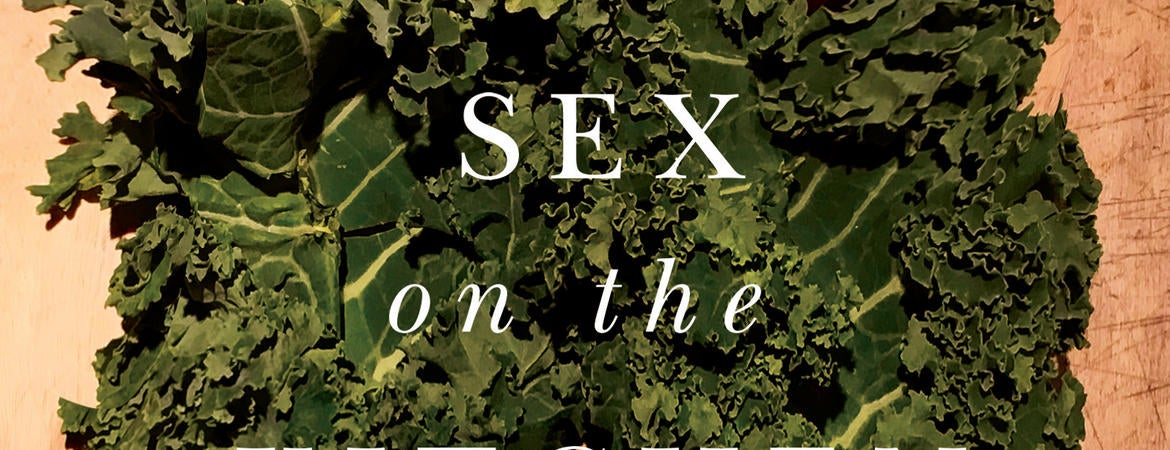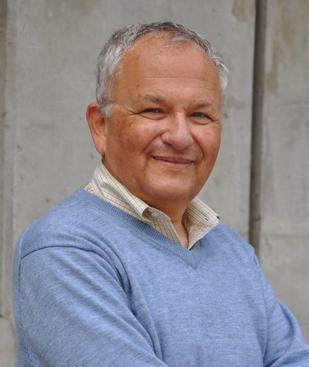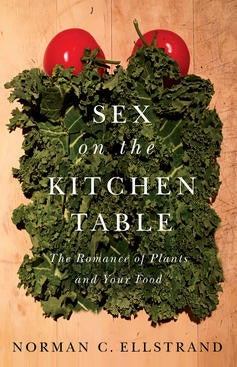
Racy avocados, loose sugar beets? A recipe not for disaster, but for dinner.
Going where no book has gone before, “Sex on the Kitchen Table: The Romance of Plants and Your Food” delivers an erotica of produce inviting not just the voyeurism of the scientist or the botanist, but that of the general audience, as well.
Exploring both the sex parts of the plants we eat (there are lots) as well as the domestication of our crops (also, sex), the new work of narrative nonfiction by University of California, Riverside’s Norman Ellstrand aims to tell the story of the evolutionary origins of crops through prose, illustrations, and recipes.
Ellstrand, a distinguished professor of genetics and the Jane S. Johnson Endowed Chair in Food and Agriculture, has been studying plant mating his whole professional career. Fifteen years ago, he began crafting the book that would merge his field with his favorite hobby: foodie-ism.
By tapping into the sensual side of produce, Ellstrand says he can teach genetics in a way that doesn’t send people running.
“Sex and food are intimately intertwined, and this relationship is nowhere more evident than among the plants that sustain us,” Ellstrand wrote in an author questionnaire to University of Chicago Press, which released the book on Sept. 11. The publisher’s only predicament, Ellstrand said, is figuring out where they’ll put the book on the shelves.
“To my knowledge, a book about food and the sex that creates it has never been done before,” he said.
Whether it ends up by the cookbooks or in the science section of bookstores, Ellstrand’s not worried. By straddling the popular with the scholarly, the book is likely to find good company anywhere.
The book features many firsts likely to appeal to a range of readers, no matter where they stand on the genetically modified organism, or GMO, spectrum, a subject that is unavoidable in a book about the evolution of crops. In one instance, Ellstand features a non-GMO taco recipe beside a fully GMO taco recipe.
“You cannot find any GMO cookbooks,” said Ellstrand, who has looked hard for one to prove himself wrong. “To my knowledge, I have created the first GMO recipe.”
Other recipes in the book tie in with their chapter’s featured crop, some of the most sex-laced organisms that grace our tables today. The tomato, or “love apple,” demonstrates the myriad of ways that plants can engage in sex, topped off with a recipe for tomato pudding. In the chapters that follow, puffed banana pancakes, avocado toast, and Brazilian-style Swiss chard are among the featured recipes.
The recipes are for a foodie culture that Ellstrand was worried would be a passing phase when he first started the book. He’s glad that he was wrong, although he would like readers to know that he appreciated avocado toast before it was a thing, thanks to an avocado grower-friend.
Ironically, avocado toast would become one of the instigators of the viral movement “food porn,” a popular social media tag users often use to describe their more decadent shots of food. While food porn materialized long after Ellstrand took his first bite of avocado toast, there seems to have never been a better time to teach the radical sexual system of the avocado, the most promiscuous of the bunch, according to Ellstrand.
“Avocado trees come in two sexual flavors,” said Ellstrand, who also explains in the book how avocado trees will flower as one gender, then close and reopen a few hours later as another.
The problem is that, among like varieties, all trees are on the same schedule, morphing into either all-male or all-female trees at the same time. It’s up to growers to mix varieties carefully, and it’s all about the timing, said Ellstrand, who has sub-titled his avocado chapter “When Harry Met Sally,” after the romantic comedy.
Ellstrand is particularly happy with his chapter on sugar beets, which covers the geopolitical events of the 16th century that brought us the beet we know today. Napoleon, apparently a sugar habitué, was allegedly furious after blockades left him without sugar from cane. He demanded his scientists come up with an alternative. Scientist-guided plant sex ensued, leading to modifications in the beets’ sugar content. In spirit of the libertine era, the new beet delivered tenfold.
Ellstrand, who has been in the business of doing science to inform genetic engineering policy since 1988, directly addresses genetic engineering in the final chapter, in a review of the “original sex” in which DNA is transferred from one organism to another.
By using playful storytelling throughout the book, Ellstrand hopes to neutralize the topic of GMOs. “It's neither the spawn of the devil nor the silver bullet.” He said of the controversial topic. “We need every tool in the tool kit, but we need to be careful about how we use them,” Ellstrand writes in the book.
To celebrate the launch, Ellstrand will be joining author and colleague Roger Ransom, an Edward A. Dickson emeritus professor in the Department of History and author of “Gambling on War: Confidence, Fear, and Tragedy of the First World War,” (2018), on Sunday, Oct. 7, for a conversation and Q&A. Ellstrand and Ransom will also discuss writing works that straddle the line between the popular and the scholarly.
The event, hosted at Cellar Door Books, Riverside, is 4 p.m., and is open to the public. Tickets are $10, or free with pre-purchased copy of Ellstrand’s or Ransom’s books.
Ellstand’s previous publications include “Dangerous Liaisons? When Cultivated Plants Mate with Their Wild Relatives” (2003). He is also director of the California Agriculture and Food Enterprise (CAFÉ) at UC Riverside.





